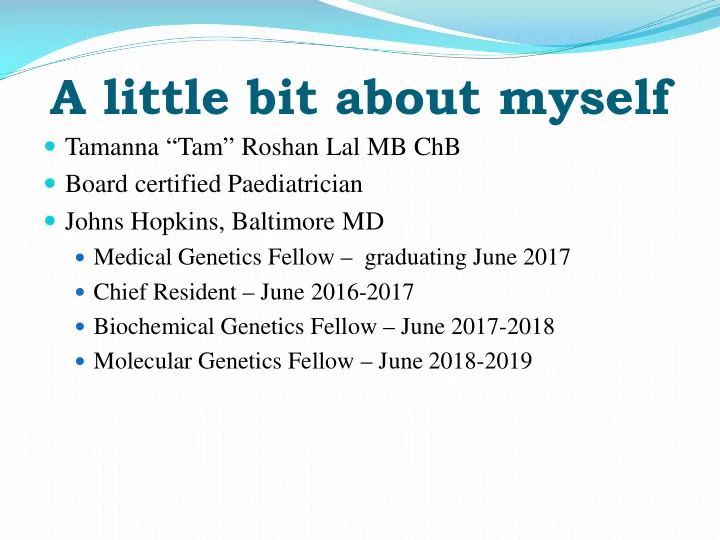

A little bit about myself Tamanna “Tam” Roshan Lal MB ChB Board certified Paediatrician Johns Hopkins, Baltimore MD Medical Genetics Fellow – graduating June 2017 Chief Resident – June 2016-2017 Biochemical Genetics Fellow – June 2017-2018 Molecular Genetics Fellow – June 2018-2019
My Journey IMU Batch M2/99 Last batch that went to the PJ campus University Manchester, United Kingdom in 2002 Graduated 2005 Foundation Training in the Greater Manchester (2 years) Paediatrics General Medicine General Surgery Obstetrics and Gynaecology General Practice 2005 to 2007
My Journey Specialist Training in Paediatrics 2007 Grand scheme/plan of specialising in Paediatrics in the UK and coming back to Malaysia BUT……the universe had other plans for me I met a man – a US Marine in 2008, whom I married in 2009 I had to move to USA This meant that I had to start my medical career from scratch It also meant I had to do the “dreaded USMLEs”
My Journey Took me 1 year to finish all 3 steps Applied for residency 95 Paediatric programmes around the US Got 4 interviews Pre-matched to a programme in Baltimore – Sinai Hospital Completed residency in 2014 Applied for fellowship in Clinical Medical Genetics Stanford Harvard UCLA Johns Hopkins
My Journey Matched to Johns Hopkins Currently am doing my fellowship at Johns Hopkins 11 years since I graduated, however: Still training Will be training until 2019 My other interest includes Global Health: Ghana Haiti
Malaysian Experience PBL based Some lectures A lot of self studying Very strong clinical exposure Prepares you well for the UK system Not as well for the US system – both pre-clinical and clinical
UK Experience PBL based as well Some lectures A lot of self studying Trains you well to be very good clinicians 2 years to be exposed to various aspects/specialisations before making a decision However, takes up to 10 years to be a consultant/attending Minimal exposure to research as a junior doctor – unless in a big teaching university hospital Benefits – get to travel to Europe often
US Experience A lot of didactics Medical students work very hard – as hard as junior doctors Have to decide what specialisation as soon as you graduate Takes 3 to 6 years to be a consultant/attending A lot of exposure to research – even as a medical student Benefit – travel around North and South America (if you can find the time)
Paediatrics Always wanted to be a Paediatrician Diagnosed my sister with chicken pox at the age of 8 My parents didn’t believe me, until she had a full blown rash Confirmed by our paediatrician See a range of patients Neonates/Infants/Toddlers Young children Teenagers/Adolescents Young adults
Paediatrics Variety of settings Office (primary care) Hospital Specialist outpatient and Inpatient Emergency Paediatric and Neonatal ICU
Clinical Medical Genetics Does anyone have an idea what is Clinical Genetics? Sub-specialty of Paediatrics Evaluate and treat individuals of all ages with known or suspected genetic disorders, or who are at risk, because of family history, to develop such a condition
Clinical Medical Genetics Working in Burnley, UK with a big Pakistani population A lot of consanguinity amongst the community Due to all the inter-marriages between cousins, there was a high rate of children with genetic syndromes and congenital abnormalities Actually had patients who had conditions that we termed “syndrome with no names
My Research Type 2 Gaucher disease – a lysosomal storage disease Extremely rare inborn error of metabolism Autosomal recessive Affects infants below the age of 12 months Neurological devastation – typically die before 2 years of age However, these children are living longer due to medical intervention up to age 5 Ventilators Gastrostomy
My Research As these children are living longer, we are seeing new signs and symptoms that we have not seen before My research is to see these patients and interview their parents to delineate the changing clinical course of this disease Important, as we can then make recommendations for treatment protocols and management goals
Future Plans Paediatric Biochemical Molecular Geneticist Involved in clinical medicine as well as research (80/20) Also includes analysing genetic testing Would also like to do global health (mission trips) 1 to 2 trips a year
Recommend
More recommend